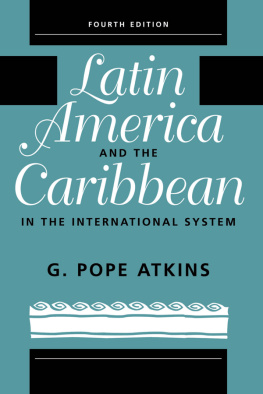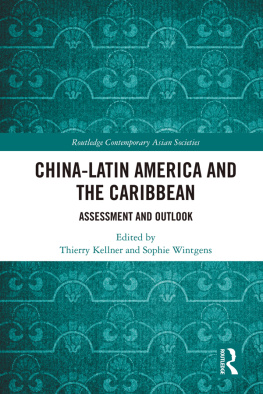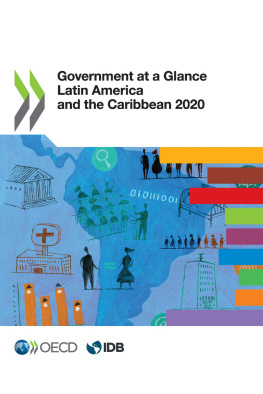Abortion in Latin America and the Caribbean
RECENT TITLES FROM THE HELEN KELLOGG INSTITUTE SERIES ON DEMOCRACY AND DEVELOPMENT
Paolo G. Carozza and Anbal Prez-Lian, series editors
The University of Notre Dame Press gratefully thanks the Helen Kellogg Institute for International Studies for its support in the publication of titles in this series.
Ignacio Walker
Democracy in Latin America: Between Hope and Despair (2013)
Laura Gmez-Mera
Power and Regionalism in Latin America: The Politics of MERCOSUR (2013)
Rosario Queirolo
The Success of the Left in Latin America: Untainted Parties, Market Reforms, and Voting Behavior (2013)
Erik Ching
Authoritarian El Salvador: Politics and the Origins of the Military Regimes, 18801940 (2013)
Brian Wampler
Activating Democracy in Brazil: Popular Participation, Social Justice, and Interlocking Institutions (2015)
J. Ricardo Tranjan
Participatory Democracy in Brazil: Socioeconomic and Political Origins (2016)
Tracy Beck Fenwick
Avoiding Governors: Federalism, Democracy, and Poverty Alleviation in Brazil and Argentina (2016)
Alexander Wilde
Religious Responses to Violence: Human Rights in Latin America Past and Present (2016)
Pedro Meira Monteiro
The Other Roots: Wandering Origins in Roots of Brazil and the Impasses of Modernity in Ibero-America (2017)
John Aerni-Flessner
Dreams for Lesotho: Independence, Foreign Assistance, and Development (2018)
Roxana Barbulescu
Migrant Integration in a Changing Europe: Migrants, European Citizens, and Co-ethnics in Italy and Spain (2019)
Matthew C. Ingram and Diana Kapiszewski
Beyond High Courts: The Justice Complex in Latin America (2019)
Kenneth P. Serbin
From Revolution to Power in Brazil: How Radical Leftists Embraced Capitalism and Struggled with Leadership (2019)
Manuel Baln and Franoise Montambeault
Legacies of the Left Turn in Latin America: The Promise of Inclusive Citizenship (2020)
For a complete list of titles from the Helen Kellogg Institute for International Studies, see http://www.undpress.nd.edu.
Abortion in Latin America
and the Caribbean
The Legal Impact of the American Convention
on Human Rights
Ligia De Jess Castaldi
University of Notre Dame Press
Notre Dame, Indiana
University of Notre Dame Press
Notre Dame, Indiana 46556
Copyright 2020 by the University of Notre Dame
All Rights Reserved
Published in the United States of America
Library of Congress Control Number: 2020937032
ISBN: 978-0-268-10765-9 (Hardback)
ISBN: 978-0-268-10768-0 (WebPDF)
ISBN: 978-0-268-10767-3 (Epub)
This e-Book was converted from the original source file by a third-party vendor. Readers who notice any formatting, textual, or readability issues are encouraged to contact the publisher at
To Richard Stith,
Emeritus Professor of Law
CONTENTS
ACKNOWLEDGMENTS
The author wishes to thank former commissioners and judges who provided invaluable commentary on this research. She also wishes to thank Marel, Antonello, and Tommaso for their support. Opinions expressed in this work are exclusively the authors.
Unofficial translations are the authors, unless otherwise indicated.
The author intervened in Artavia Murillo v. Costa Rica as amicus curiae along with former Inter-American Court Judge Rafael Nieto Navia and law professors Jane Adolphe and Richard Stith.
ABBREVIATIONS
| CEDAW | Convention on the Elimination of All Forms of Discrimination against Women |
| CRC | Convention on the Rights of the Child |
| ECJ | European Court of Justice |
| IACHR | Inter-American Commission on Human Rights |
| ICCPR | International Covenant on Civil and Political Rights |
| ICPD | International Conference on Population and Development |
| IVF | in vitro fertilization |
| OAS | Organization of American States |
| UDHR | Universal Declaration of Human Rights |
| UN | United Nations |
| VCLT | Vienna Convention on the Law of Treaties |
Introduction
By ratifying the American Convention on Human Rights, most Latin American and Caribbean nations have undertaken an international obligation to legally protect every persons right to life from the moment of conception. Every person has the right to have his life respected. This right shall be protected by law and, in general, from the moment of conception. No one shall be arbitrarily deprived of his life.
The recognition of a right to life from conception in the American Convention seems to have been distinctly inspired by a Catholic moral tradition of respect for prenatal life and a Latin American Catholic understanding of human rights law in general.
Since the adoption of the treaty text including a prenatal right to life from conception in 1969, twenty-three countries have ratified the American Convention, namely Argentina, Barbados, Bolivia, Brazil, Chile, Colombia, Costa Rica, Dominica, Dominican Republic, Ecuador, El Salvador, Grenada, Guatemala, Haiti, Honduras, Jamaica, Mexico, Nicaragua, Panama, Paraguay, Peru, Suriname, and Uruguay. On the other hand, it has not as of 2019 withdrawn or expressed an intent to withdraw its signature.
In the last few decades, however, international human rights bodies have repeatedly urged Latin American and Caribbean nations to decriminalize and provide access to abortion, notwithstanding the American Conventions recognition of a general state duty to legally protect prenatal life. United Nations treaty bodies have repeatedly told Latin American and Caribbean states that international human rights treaties require the creation of abortion rights, as explained in chapter 6, and that legally authorizing abortion would reduce maternal mortality rates in the region.
Proposals to abolish prenatal life protections and to create a legal entitlement to abortion have also been advanced at the national level, and regionally through the Inter-American human rights system. Starting with the Inter-American Commission on Human Rights Baby Boy report in 1981, a series of abortion-related hearings and petitions have provoked reports promoting decriminalization of abortion in several Latin American and Caribbean countries, as described in chapter 1. The Inter-American Court then suggested in 2012 that decriminalization of abortion, especially at an early gestational age, may be legally compatible with the convention, in the Artavia v. Costa Rica judgment dicta, as discussed in chapter 2. The judgment, which cited Roe v. Wade along with German and Spanish high court judgments on abortion, suggested a desire to identify with Western European and North American feminist visions of human rights to the detriment of the prenatal right to life as recognized by states parties to the American Convention.
As of 2019, no state party to the American Convention has fully decriminalized abortion despite a significant prevalence of advocacy for the creation of abortion rights in international human rights politics. Such advocacy has nevertheless deeply divided nations and individuals within the Inter-American human rights system, forcing them to take a position on a single issue that, since the 1970s, seems to have taken precedence over all other feminist causes. It has pitted believers against nonbelievers, liberals against conservatives, nationalists against globalists both in states parties to the American Convention and within the Inter-American system of human rights itself. It has raised larger jurisprudential questions regarding interpretation of international human rights treaties, how new rights are created, and who has the authority to do soquestions explored in this book. At the national level, advocacy for abortion rights has led to separation of powers issues and has brought constitutional procedures and federalism principles into question, as illustrated here.





